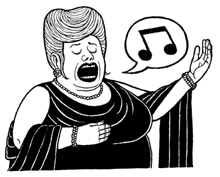
Главная страница Случайная страница
Разделы сайта
АвтомобилиАстрономияБиологияГеографияДом и садДругие языкиДругоеИнформатикаИсторияКультураЛитератураЛогикаМатематикаМедицинаМеталлургияМеханикаОбразованиеОхрана трудаПедагогикаПолитикаПравоПсихологияРелигияРиторикаСоциологияСпортСтроительствоТехнологияТуризмФизикаФилософияФинансыХимияЧерчениеЭкологияЭкономикаЭлектроника
Maria Callas. 6. Read the text and discuss it with other students
|
|
6. Read the text and discuss it with other students. Which fat and slender opera singers do you know? How do you think, is there any connection between singer’s weight and talent?
Why are the opera singers so fat?
 There are several theories attempting to explain why opera singers are often pleasingly plump. One holds that a large amount of fatty tissue surrounding the voice box (larynx) increases its resonance capability and thus produces a more pleasing sound. The amount of this fatty tissue varies from singer to singer. It is almost impossible to have a great deal of fatty tissue around the voice box without carrying a great deal of fatty tissue elsewhere on the body.
There are several theories attempting to explain why opera singers are often pleasingly plump. One holds that a large amount of fatty tissue surrounding the voice box (larynx) increases its resonance capability and thus produces a more pleasing sound. The amount of this fatty tissue varies from singer to singer. It is almost impossible to have a great deal of fatty tissue around the voice box without carrying a great deal of fatty tissue elsewhere on the body.
A second theory holds that opera singers need a far more powerful diaphragm than normal to be able to project their voice above the sound of a large orchestra in a large opera house. A large chest cavity and good control of the lungs will provide a suitable mass to help drive the diaphragm to some extent. A large body mass and a large body frame to support it help even more, so there is a huge advantage in being huge.
In the eighteenth and nineteenth centuries, when opera was an expanding medium, successive generations of opera producers sought larger and more dramatic effects in operas, larger audiences, and larger theatres. Being human, singers could not be re-engineered, so better vocal techniques were developed to better cope with this steady rise in size and volume – in all things.
Consistent with this, it was recognised that there was an advantage in having a large chest, rib cage, neck, mouth, everything. The desire for larger singers was not the only change. New technology for wind instruments and the reconstruction of older baroque string instruments also came about as the result of opera innovations.
— Регулярная проверка качества ссылок по более чем 100 показателям и ежедневный пересчет показателей качества проекта.
— Все известные форматы ссылок: арендные ссылки, вечные ссылки, публикации (упоминания, мнения, отзывы, статьи, пресс-релизы).
— SeoHammer покажет, где рост или падение, а также запросы, на которые нужно обратить внимание.
SeoHammer еще предоставляет технологию Буст, она ускоряет продвижение в десятки раз, а первые результаты появляются уже в течение первых 7 дней. Зарегистрироваться и Начать продвижение
A third theory comes from Dr. Peter Osin of the Royal Marsden Hospital in London. Dr. Osin argues that opera singers “may be more predisposed to put on weight because exertions in the lungs act as a trigger for their appetite”. He adds that “the mechanism of singing encourages the lung cells to release chemicals including leptin, a protein made by the body’s fat cells that is involved in the regulation of appetite”.
A fourth theory holds that the act of opera singing itself expands the body, particularly the rib cage. After years of singing, the opera singer’s body may look fat, perhaps fatter than it really is. This is the implication of Australian research by Dr. CW Thorpe and three colleagues from the National Voice Centre at the University of Sydney and published in the Journal of Voice 2001.
No doubt other theories will emerge. None can so far claim to be proven. As they say: “The opera ain’t over until the fat lady sings”.
Interesting facts:
- There are exceptions to the rule that opera singers are fat. Jose Carreras, one of the most famous tenors of the last 50 years, is only 170 centimeters tall (5 feet six inches) and is rather average in body mass.
- In 2004, opera singer Deborah Voigt was dismissed from a Royal Opera House production in London because she was too fat.
- Many opera devotees fondly refer to “Madame Butterfly”, one of the most famous operas and diva roles, as “Madame Butterball”.
- The phrase, “The opera ain’t over until the fat lady sings”, has been attributed to, among others, US sportscaster Dan Cook, US basketball coach Dick Motta, US baseball player Yogi Berra, US author Damon Runyon, and that ageless savant (no nationality) Anonymous.
|
|
